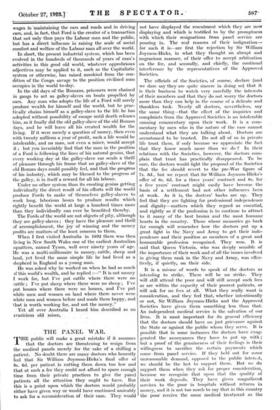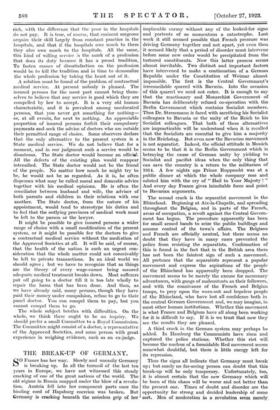THE PANEL WAR. T HE public will make a great mistake
if it assumes that the doctors are threatening to resign from the medical panels merely for the sake of a shilling a patient. No doubt there are many doctors .who honestly feel that Sir William Joynson-Hicks's final offer of 8s. 6d. per patient is cutting them down too low and that at such a fee they could not afford to spare enough time from their private practices to give the panel patients all the attention they ought to have. But this is a point upon which the doctors .would probably either have given way or would have continued amicably to ask for a reconsideration of their case. They would not have displayed the resentment which they are now displaying and which is testified to by the promptness with which their resignations from panel service are pouring in. The real reasons of their indignation— for such it is—are first the rejection by Sir William Joynson-Hicks, in what they thought an abrupt and ungracious manner, of their offer to accept arbitration on the fee, and secondly, and chiefly, the continual interference by the representatives of the Approved Societies.
The officials of the Societies, of course, declare (and we dare say they are quite sincere in doing so) that it is their business to watch very carefully the interests of their members and that they do not worry the doctors more than they can help in the course of a delicate and thankless task. Nearly all doctors, nevertheless, say the same thing—that the effect of the inquiries and complaints from the Approved Societies is an intolerable running commentary upon their work. It is a com- mentary by men who in the nature of the case cannot understand what they are talking about. Doctors are accustomed to be trusted. Do not all of us in private life trust them, if only because we appreciate the fact that they know much more than we do ? In their relations with the Societies, however, the doctors com- plain that trust has practically disappeared. To be sure, the doctors would fight the proposal of the Societies that the fee should revert to the pre-War figure of 7s. 3d., but we repeat that Sir William Joynson-Hicks's offer of 8s. 6d. for a three years' contract and 8s. for a five years' contract might easily have become the basis of a settlement had not other influences been at work. As it is, the doctors' backs are up. They feel that they are fighting for professional independence and dignity—.matters which they regard as essential, and rightly so if the profession is to continue to attract to it many of the best brains and the most humane hearts in the country. Those whose memories go back far enough will remember how the doctors put up a great fight in the Navy and Army to get their inde- pendence and their position as members of a great and honourable profession recognized. They won. It is said that Queen Victoria, who was deeply sensible of the importance of their work and of all the issues involved in giving them rank in the Navy and Army, was effec- tively, if quietly, on their side.
It is a misuse of words to speak of the doctors as intending to strike. There will be no strike. They will still attend the poor and will still accept such fees as are within the capacity of their poorest patients, or will ask for no fees at all. What they really want is consideration, and they feel that, whether intentionally or not, Sir- William Joynson-Hicks and the Approved Societies have given them something less than that. An independent medical service is the salvation of our lives. • It is most important for its general efficiency that the doctors should have no just grievance against the State or against the public whom they serve. It is possible that in some instances the doctors have exag- gerated the annoyances they have to put up with ;- but a proof of the genuineness of their feelings is their willingness to sacrifice the certain payments which come .from panel service. If they held out for some unreasonable demand, opposed . to the public intere,t, we should be the last to support them. But we do support them when they ask for proper consideration,- because we recognize that upon that the quality of their work depends. They have given magnificent services to the poor in hospitals without returns in money, and it is not too much to say that in this country the poor receive the same medical treatment as the rich, with the difference that the poor in the hospitals do not pay. It is true, of course, that eminent surgeons acquire their skill largely from constant practice in the hospitals, and that if the hospitals owe much to them they also owe much to the hospitals. All the same, this kind of willing service is the mark of a profession that does its duty because it has a proud tradition. To fasten causes of dissatisfaction on the profession would be to kill the tradition and in time to demoralize the whole profession by taking the heart out of it.
A solution must be found of the problem of contractual medical service. At present nobody is pleased. The insured persons for the most part cannot bring them- selves to believe that any service is good which they are compelled by law to accept. It is a very old human characteristic, and it is prevalent among uneducated persons, that you never get something for nothing— or, at all events, for next to nothing. An appreciable proportion of insured persons forfeit their compulsory payments and seek the advice of doctors who are outside their permitted range of choice. Some observers declare that the only alternative to the present system is a State medical service. We do not believe that for a moment, and in our judgment such a service would be disastrous. The State doctor would become an official. All the defects of the existing plan would reappear intensified. The State doctor would not be the friend of the people. No matter how much he might try to be, he would not be so regarded. As it is, he often dispenses what may be called moral and domestic advice together with his medical opinions. He is often the conciliator between husband and wife, the adviser of both parents and children in their relations with one another. The State doctor, from the nature of his appointment, would tend to stereotype his duties and to feel that the outlying provinces of medical work must be left to the parson or the lawyer.
It might be possible to give insured persons a wider range of choice with a small modification of the present system, or it might be possible for the doctors to give a contractual medical service without the mediation of the Approved Societies at all. It will be said, of course, that the health of the nation is such an urgent con- sideration that the whole matter could not conceivably be left to private transactions. In an ideal world we should agree ; but we have to recognize that as things are the theory of every wage-earner being assured adequate medical treatment breaks down. Most sufferers put off going to a doctor till it is too late wholly to repair the harm that has been done. And then, as we have already said, many persons, though they have paid their money under compulsion, refuse to go to their panel doctor. You can compel them to pay, but you cannot compel them to go.
The whole subject bristles with difficulties. On the whole, we think there ought to be an inquiry. We should prefer a small Committee to a Royal Commission. The Committee might consist of a doctor, a representative of the Approved Societies, and some person with great experience in weighing evidence, such as an ex-judge.















































 Previous page
Previous page